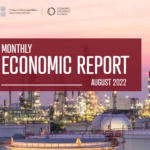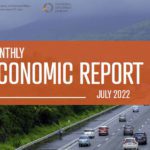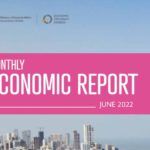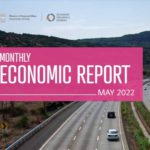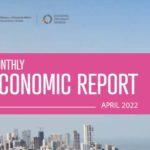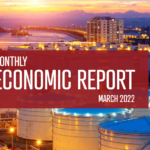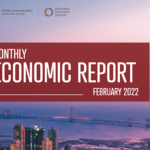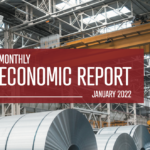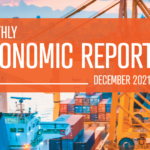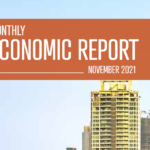-

Monthly Economic Report (August 2022)
When slowing growth and high inflation are afflicting most of the world’s major economies, India’s growth has been robust, and inflation is in control. Rapid vaccination coverage and well-calibrated short term policy measures have skilfully navigated the economy through turbulent times, preparing a solid foundation to build a prosperous nation in the years ahead. Prudent fiscal management and credible monetary policy will remain essential for India to fulfil its growth aspirations.
-

Analysis of Logistical Issues impacting India-Turkmenistan trade and possible solutions
Country overview and industrial regulations of Turkmenistan, current logistics scenario between India and Turkmenistan, and strategy for Indian businesses to deal with logistical issues
-

Doing Business in Turkmenistan
Report includes industry regulations of Turkmenistan, registration process for starting business in Turkmenistan, and specific issues for Indian companies related to custom clearance
-

Monthly Economic Report – July 2022
India’s growth outlook for 2022-23, though lower than projections made before the outbreak of the conflict in Europe which resulted in a sharply higher price for crude oil and other essential commodities, is still comfortably high and confirms the recovery of the economy from the pandemic-induced contraction in 2021-22. The private sector and banking sector balance sheets are healthy and there is an appetite to borrow and to lend respectively. Therefore, barring further adverse shocks to commodity prices, India’s terms of trade, economic growth will consolidate and retain its momentum into 2023- 24.
-

Monthly Economic Report (June 2022)
Economic activity is holding up better than expected despite the ongoing geopolitical tensions; rise in interest rates in America and in India and the elevated price of crude oil and few other commodities. The services sector recovery is continuing, and manufacturing strength is steady. There is an apparent keenness to invest on the part of the private sector. Banks are willing to lend and their financial health, as the central bank’s stress tests reveal, is quite strong. Brisk GST receipts monthly confirm the momentum in the economic activity.
-

Monthly Economic Report (May 2022)
The balancing act between maintaining growth momentum, restraining inflation, keeping the fiscal deficit within budget and ensuring a gradual evolution of the exchange rate in line with underlying external fundamentals of the economy is the challenge for policymaking this financial year. Successfully pulling it off will require prioritising macroeconomic stability over near-term growth.
-

Monthly Economic Report (April 2022)
IMF World Economic Outlook April 2022 projects India to be the fastest growing economy at 8.2% in FY 2022 and 6.9% in FY 2023. Lending credence to these projections, the fiscal year 2022-23 has begun with strong growth momentum in economic activity as indicated by the robust performance of high-frequency indicators such as e-way bill generation, ETC toll collection, electricity consumption, and PMI manufacturing and services. Government measures to keep the prices of these commodities in check along with the recent hike in policy rates by the RBI are expected to temper inflationary pressures in the economy.
-

Monthly Economic Report (March 2022)
According to the second advanced estimates, several contact sensitive sectors are yet to cross the levels of pre-pandemic growth. The Production Linked Incentives (PLI) schemes are expected to enhance the export potential of multiple sectors of the economy and increase self sufficiency in manufacturing. Initiatives such as Gatishakti are expected to bolster capital investments in infrastcurture and bridge existing gaps in the system. Structural reforms initiated by the government are expected to serve as guardrails against external shocks to economic activities. The persistence of high prices as a result of the Russia-Ukraine conflict has the potential to impact economic activity. Although the aformentioned instability can pose supply chain disruptions and upside risks to information, positive domestic trends including the increase in GST collections and capital expenditure could moderate the impact.
-

Monthly Economic Report (February 2022)
The second advance estimates of GDP released on 28th February 2022 signals the full recovery of India’s economy with real GDP of FY 2021-22 estimated to go past the output of pre-pandemic levels. Further, real GDP estimates for Q3 of 2021-22 indicate strong growth momentum, aided by rapid vaccination coverage along with accommodative monetary and fiscal policy support.
-

Monthly Economic Report (January 2022)
Overall economic activity has continued to be resilient amid the third wave of COVID-19. This is reflected in the robust performance of several high-frequency indicators like power consumption, PMI manufacturing, exports, and e-way bill generation. Further, the Union Budget’s commitment towards public infrastructure development will encourage private investment, augmenting inclusive and sustainable growth. It is a testament to the farsightedness of policymaking that the Indian economy that contracted by (-) 6.6% in 2020-21, is now projected to grow the quickest among the group of large nations in 2022-23.
-

Monthly Economic Report (December 2021)
As India continues with the rapid vaccination program, it has not only caught up with its pre-pandemic Q2 output but is expected to surpass it over the next fiscal. India is poised to be among the few economies that will rebound strongly from the pandemic-induced economic contraction of 2020-21.
-

Union Budget 2022-23
Infrastructure emerged as the topmost priority for the Narendra Modi government as the finance minister Smt. Nirmala Sitharaman said that the Budget 2022-2023 will lay the foundation for economic growth through public investment as Asia’s third-largest economy emerges from a pandemic-induced slump.
-

Monthly Economic Report (November 2021)
Although 2020-21 is being deemed as a “catch-up” year for global economies, the RBI has projected a 9.5% GDP growth for FY 2021-22, implying a full economic recovery, which can be attributed to India’s nuanced structural reforms. Leveraging on necessary macro and micro growth drivers, India is on course to be one of the few global economies to rebound strongly from pandemic-induced economic contraction.
-

Monthly Economic Report (October 2021)
Atmanirbhar Bharat Mission continues to play a critical role in shaping India’s economic recovery – both through the signaling of business opportunities and expansion of spending channels. It can be concluded that leveraging on necessary macro and micro growth drivers, India’s investment cycle is ready to catalyze its recovery towards becoming the fastest growing economy in the world.
-

Monthly Economic Report (September 2021)
The current pace of growth coupled with improvements across fiscal parameters attests to the resilience of the Indian economy. The strong performance of multiple sectors including manufacturing, agriculture, and industries as well as increased revenue collection and resumption of services are expected to sustain the nation’s overall growth trajectory.
